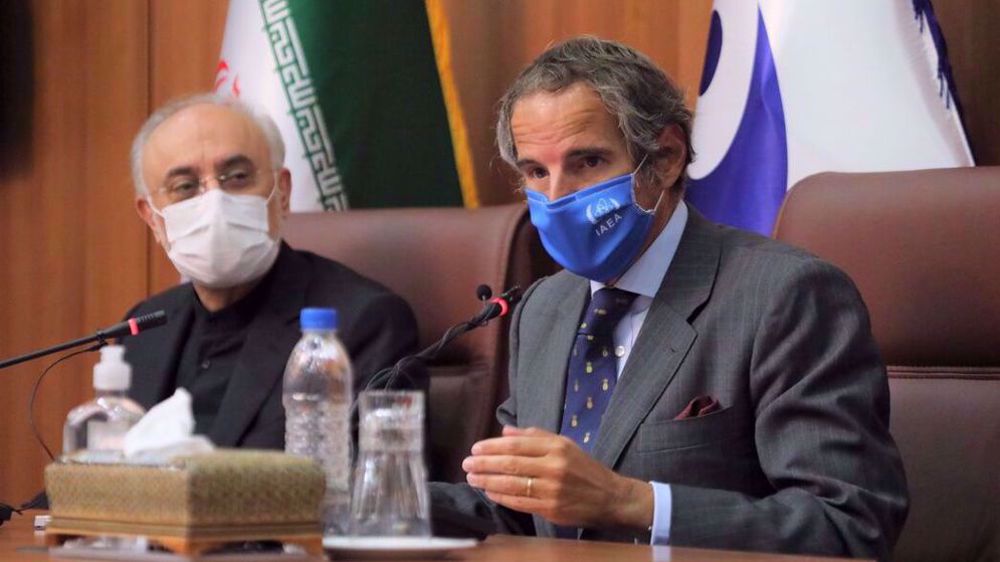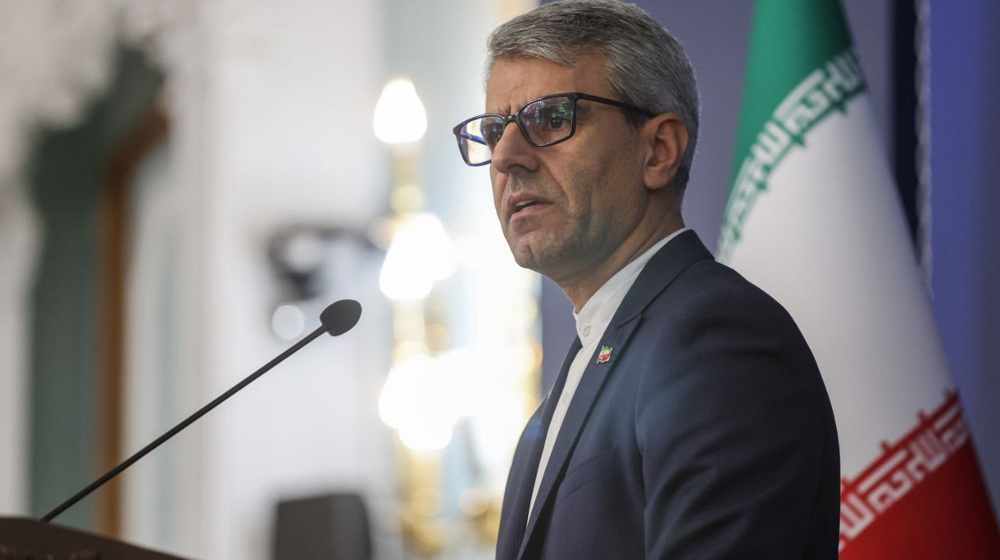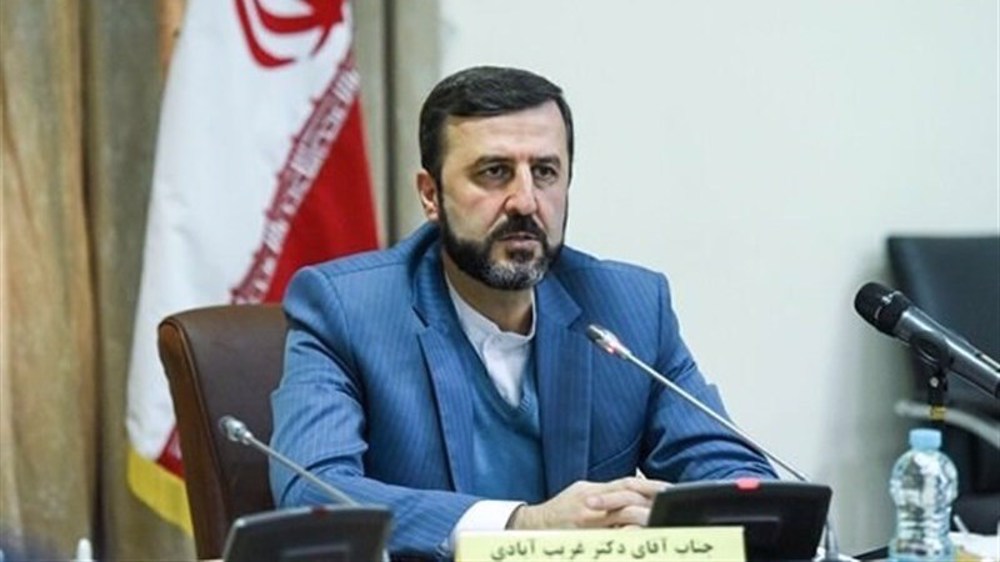Iran nuclear chief responds to Grossi’s letter on recent cooperation with IAEA
Iran’s permanent representative to Vienna-based international organizations says the country’s nuclear chief has sent a letter to the UN nuclear agency head, welcoming the latter’s readiness for “proactive and focused effort” to settle issues pertaining to Tehran’s nuclear activities.
Speaking to reporters on Tuesday, Kazem Gharibabadi said Head of the Atomic Energy Organization of Iran (AEOI) Ali Akbar Salehi wrote to Director General of the International Atomic Energy Agency (IAEA) Rafael Mariano Grossi in response to his letter last week regarding the two sides’ phone conversation about a joint technical understanding which expired on May 24, IRNA reported.
In a series of tweets, Gharibabadi gave information about the content of Salehi’s letter and said Iran recently agreed to keep recording its nuclear facilities for another month, despite the expiry of the understanding, in order to continue technical talks with the IAEA.
“Whereas the Technical Understanding was expired on May 24, Iran decided not to extend it, meanwhile we decided to continue recording for one month aimed at providing another opportunity to conclude bilateral tech negotiations with the Agency,” he tweeted.
Dr. Salehi's letter to @rafaelmgrossi:Whereas the Technical Understanding was expired on May 24, Iran decided not to extend it, meanwhile we decided to continue recording for one month aimed at providing another opportunity to conclude bilateral tech negotiations with the Agency1
— Gharibabadi (@Gharibabadi) May 31, 2021
On May 24, Iran and the IAEA agreed to extend by one month the agreement they had clinched for the UN nuclear agency to continue inspection of the country's nuclear sites amid the ongoing talks in Vienna on the revival of the 2015 landmark nuclear deal, officially known as the Joint Comprehensive Plan of Action (JCPOA), which was abandoned by the United States three years later.
Under former president Donald Trump, the US withdrew from the JCPOA and also initiated a “maximum pressure” policy against Iran, prompting Tehran to take remedial measures by gradually reducing its nuclear commitments under the deal.
In February, Iran halted its voluntary implementation of the Additional Protocol that allowed the IAEA to carry short-notice inspections at its nuclear sites.
Later in February, Iran and the IAEA reached a technical understanding under which Iran continued to keep the camera footage at its nuclear sites for up to three months in a goodwill gesture in support of diplomacy, waiting to see whether the other parties to the JCPOA could manage to bring the US back into full compliance with the deal.
In another tweet, which came a day after the IAEA’s latest quarterly report, Gharibabadi said Iran has had full cooperation with the agency “substantively” and provided it with the “necessary clarifications and responses.”
On safeguards, Iran has so far done its utmost efforts to cooperate with the Agency substantively and provide the necessary clarifications and responses. We welcome the Agency’s readiness for engaging in a proactive and focused effort to resolve the issues without any delay. 2
— Gharibabadi (@Gharibabadi) May 31, 2021
“On safeguards, Iran has so far done its utmost efforts to cooperate with the Agency substantively and provide the necessary clarifications and responses. We welcome the Agency’s readiness for engaging in a proactive and focused effort to resolve the issues without any delay,” the Iranian ambassador said.
In its quarterly report that the IAEA released on Monday, it outlined how Iran had reduced its nuclear commitments in several key areas, including the extent of its enriched uranium stockpile. According to the report, the Islamic Republic has increased its stockpile of the material to around 16 times the limit that has been specified in the JCPOA.
In his third tweet, Gharibabadi said the AEOI chief had once again reiterated Iran’s readiness to “cooperate constructively” with the UN nuclear agency.
And as before, we would continue to cooperate constructively with the Agency. We highly expect such a mutually determination would result in reaching a visible practical outcome as quickly as possible. 3
— Gharibabadi (@Gharibabadi) May 31, 2021
“And as before, we would continue to cooperate constructively with the Agency. We highly expect such a mutually determination would result in reaching a visible practical outcome as quickly as possible,” the ambassador tweeted.
Trump’s successor, Joe Biden, says his administration wants to rejoin the JCPOA, but Tehran says it must first lift all the sanctions Washington imposed on Iran in the aftermath of leaving the deal practically and verifiably before it can come back.
Representatives of Iran and the other five signatories to the nuclear agreement, namely Britain, France, Germany, Russia and China, have been engaged in the Vienna process since early April with the purpose of finding ways to bring the United States back to the deal and prepare the ground for its full implementation.
Everything is so much complicated in relations between Iran, IAEA: Russia’s Ulyanov
In a post on his Twitter account on Tuesday, Mikhail Ulyanov, the Russian ambassador to the international organizations in Vienna, expressed regret about complications in relations between Iran and the IAEA, however, hailed the two sides’ readiness to continue cooperation.
Everything is so much complicated in relations between #Iran and the #IAEA to our regret! Nevertheless we appreciate the fact that they continue to maintain the necessary level of cooperation. We have reasons to believe that the current difficulties are of temporary character. https://t.co/g6mqLYW3CW
— Mikhail Ulyanov (@Amb_Ulyanov) May 31, 2021
“Everything is so much complicated in relations between #Iran and the #IAEA to our regret! Nevertheless, we appreciate the fact that they continue to maintain the necessary level of cooperation. We have reasons to believe that the current difficulties are of temporary character,” the top Russian diplomat tweeted.
Senior cmdr. strongly warns Trump following rhetorical remarks concerning Leader
EU Parliament halts US trade deal after Trump tariff threat
VIDEO | An unchecked presidency
VIDEO | Deportations strain Afghanistan’s fragile economy
‘Full-scale atrocity’: Iran security body reports 2,427 martyrs in US-Israeli-led riots
Smallest coffins are the heaviest: The three youngest victims of foreign-backed riots in Iran
Hamas warns of ‘systematic Israeli violations’ as Gaza ceasefire teeters
Israeli strikes kill 11 across Gaza, including children and journalists: Palestinian medics












 This makes it easy to access the Press TV website
This makes it easy to access the Press TV website